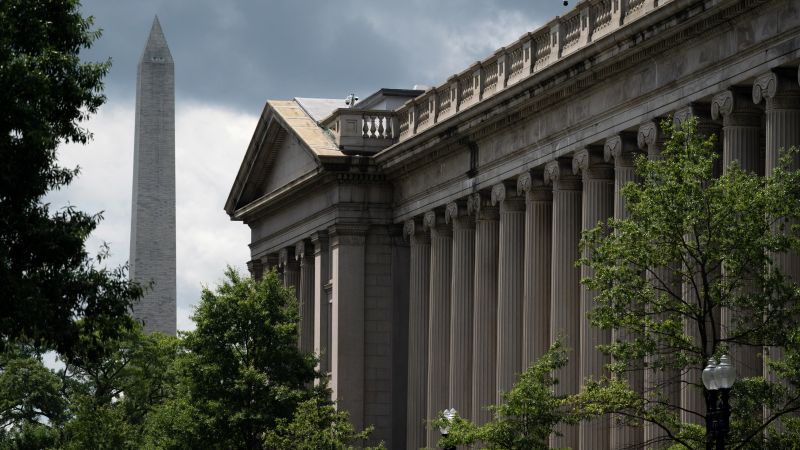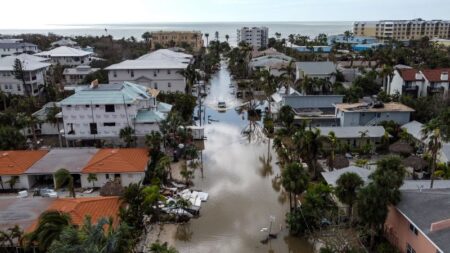World leaders are flocking to Davos this week to pontificate on the planet’s most pressing problems.
Two major wars, a shipping crisis, cyber attacks on state institutions and yet more alarming evidence of the climate emergency mean there’s no shortage of talking points.
But turning ideas into action when governments owe an unprecedented $88.1 trillion — equivalent almost to the world’s annual economic output — will be hard.
Public debt exploded during the pandemic and new borrowing this year is likely to break records in several big economies, leaving governments less able to respond to shocks such as financial meltdowns, pandemics or wars.
Even in the absence of a new crisis, soaring debt servicing costs will constrain efforts to tackle climate change and care for aging populations. Public services in many countries are already strained after successive budget cuts.
More worryingly still, as debt burdens grow, governments could find themselves unable to borrow more to service existing obligations and fund basic services adequately.
A government unable to finance its debt “would be forced to implement abrupt and painful” spending cuts or tax hikes, said Michael Saunders, a former member of the Bank of England’s monetary policy committee.
“And such a government may lack the fiscal space to respond to future adverse shocks, preventing fiscal support when it is most needed,” he told CNN.
Saunders, now a senior economic adviser at consultancy Oxford Economics, doesn’t think rich economies are approaching what is roughly equivalent to a personal credit limit and points to sustained investor appetite for government debt. But that’s not to say the limit won’t be tested “10, 20, 30 years from now.”
The United Kingdom — the world’s sixth-biggest economy — offers a cautionary tale of how badly things can go wrong when investors reject a government’s plan to borrow.
In September 2022, the pound and UK government bonds, or gilts, sold off sharply, partly in response to plans by former Prime Minister Liz Truss to issue more debt in order to pay for tax cuts. Mortgage rates and other borrowing costs soared as investors demanded much higher premiums for owning UK debt.
The Bank of England was ultimately forced to intervene and pledge to buy gilts on “whatever scale is necessary.”
“Were dysfunction in this market to continue or worsen, there would be a material risk to UK financial stability,” Dave Ramsden, a senior official at the central bank, said at the time. “This would lead to … a reduction of the flow of credit to the real economy.”
While central banks can provide temporary emergency support, they cannot finance government deficits in lieu of bond investors.
Just ask crisis-stricken Argentina, where for years the central bank printed pesos to help the country’s spendthrift government continue paying interest on its debt and avoid default. That tactic caused the value of the currency to plummet and prices to rocket. Annual inflation exceeded 211% last month, the highest level in three decades.
Government budgets will face renewed scrutiny this year from investors on high alert for politicians tempted to make promises in a bid to win over voters.
Half the world’s population is going to the polls. That swathe of elections means little incentive for belt-tightening among incumbent administrations, while also raising the prospect that incoming leaders will seek to make their mark with new tax and spending plans.
Already, debt is shaping up to be a key issue in this year’s US elections, which will culminate in the presidential election in November. Record levels of public borrowing have become a major point of contention between Republicans and Democrats, aggravating standoffs over the national budget that periodically threaten to starve federal agencies of funds and prevent them from operating.
Mounting debt and political brinksmanship have already taken their toll on America’s credit rating, which typically affects borrowing costs for the government, businesses and households.
Fitch cut its rating on US sovereign debt to AA+ from the top AAA grade last August, citing political polarization as a factor in its decision. Meanwhile, in November, Moody’s warned that it could also remove the United States’ last remaining perfect rating from the big three ratings agencies.
“One of the key elements sustaining a country’s credibility on its ability to repay (debt) is political consensus,” said Raghuram Rajan, a former governor of the Reserve Bank of India.
“It’s not unimaginable that if democracy takes a downturn in the United States, if there is a sense that there will be a political calamity,” the value of US sovereign bonds would fall, he added. And that would increase the government’s borrowing costs.
Even if the worst scenarios are avoided, the increased cost of servicing debt after a recent rapid rise in official interest rates is siphoning ever greater amounts of money away from vital public services — and making it harder to address the climate crisis.
According to reports in UK media, Britain’s main opposition Labour Party has scaled back some of its enormous green spending plans because of concerns about adding to country’s debt burden.
In the current financial year, which ends on April 5, the UK government is expected to spend more on debt interest (£94 billion, or $120 billion) than on either education or defense, according to the Office for Budget Responsibility, a fiscal watchdog.
In the United States, interest costs on a common measure soared to $659 billion in fiscal year 2023, which ended on September 30, according to the Treasury Department. That’s up 39% from the previous year and nearly double what it was in fiscal year 2020.
In 2023 the government spent more to service its debt than it did on each of housing, transport and higher education, according to the Committee for a Responsible Federal Budget, a non-profit.
The surge in advanced economies’ debt that those hefty interest payments partly illustrate coincides with slowing economic growth and a rise in the number of the elderly relative to working-age people. Against that backdrop, it’s unclear how the world will dig itself out of its debt hole.
“What could rescue us relatively painlessly is if we have huge productivity improvements without job losses,” Rajan, now a professor of finance at the University of Chicago Booth School of Business, told CNN, suggesting that artificial intelligence could hold the key.
Indeed, many experts think an AI-powered productivity boom could transform the global economy’s fortunes.
Let’s hope that over the next few days in Switzerland they tell us how.
Anna Cooban contributed reporting.
Read the full article here












